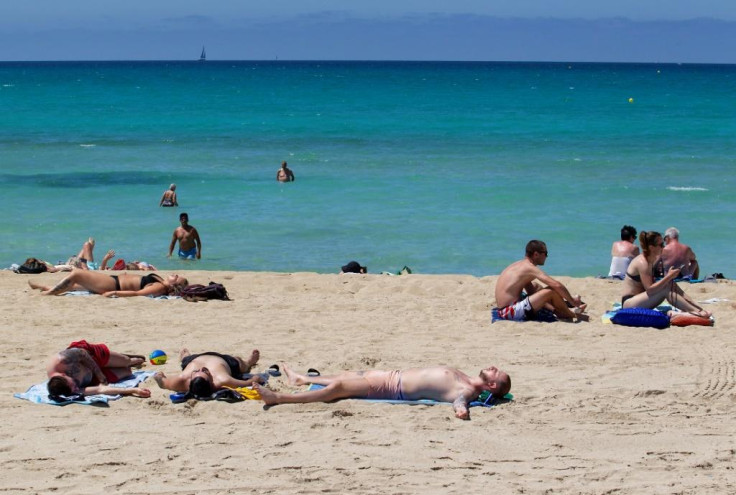Fury as Majorca and Ibiza Prepare to Use Tourist Hotels for Illegal Migrants After Surge in Boat Landings

KEY POINTS
- Spanish government allocates €6.7m to fund migrant care facilities.
- Hotels identified to host families, women fleeing violence and overflow cases.
- Police unions warn they are 'overwhelmed' and lack data on new arrivals.
Holidaymakers' favourite destinations Majorca and Ibiza could soon be used to house asylum seekers in government-funded 'migrant hotels' after a sharp rise in illegal boat arrivals to the Balearic Islands.
According to local reports, Spain's central government has earmarked €6.7 million (£5.7 million) to help the islands cope with the crisis, sparking uproar among regional leaders and residents who warn the move risks damaging the tourism-driven economy.
Surge in Arrivals
The Balearics — comprising Majorca, Ibiza, Menorca and Formentera — have witnessed a dramatic escalation in migrant arrivals this summer. Some 639 people reached the islands over just three days earlier this month, arriving on 38 small wooden vessels known as pateras.
The total number of arrivals has already reached around 4,500 for the year, up 77 per cent on the previous 12 months. Most of the boats are believed to originate in Algeria.
By contrast, the Canary Islands — another major entry point for irregular migration into Spain — have seen a 46 per cent decrease in arrivals.
Regional leader Marga Prohens demanded urgent action from Madrid, declaring earlier this month: 'Where is the government of (Pedro) Sanchez?' She called for more police resources and closer cooperation with Algeria to curb the crossings.
Hotels Earmarked for Migrants
With existing temporary accommodation stretched, the Spanish Ministry of Inclusion, Social Security and Migration has authorised the use of hotels to absorb excess demand.
The Majorca Daily Bulletin reported that funding would be used to create new facilities at the Port of Palma, as well as to support hotels under 'exceptional circumstances' such as hosting entire families or women fleeing violence.
These hotels would reportedly be staffed with translators, security guards, medical teams, legal advisors and dining facilities. Additional funds are expected to help transport migrants to and from the Spanish mainland under a government-run humanitarian programme.
Madrid's delegate in the Balearics has already confirmed that some hotels have been identified for potential use, though it remains unclear whether they are the same establishments regularly used by British tourists.
Local Anger and Political Clashes
The proposals have provoked anger in the region, where resentment over overtourism has already been running high. Protesters earlier this summer staged anti-tourist demonstrations in Majorca and Ibiza, with graffiti demanding 'tourists out' and some incidents of water pistols being fired at visitors.
Manuel Pavón, the newly appointed director-general for immigration and cooperation in the Balearics and a former police officer, criticised Madrid's handling of the situation.
'Perhaps he's forgotten that I'm a police officer. Every time waves of boats arrive, the police unions complain that they don't have the resources and that people aren't monitored,' he said.
'We must recognise that we don't know who arrives, where they're going, or what they've done; we have no data, and the police are overwhelmed.'
The Balearic government is reportedly preparing to take its case to Spain's Supreme Court, arguing that resources and funding are insufficient to absorb such large numbers of arrivals.
Tourists Weigh In
News of the plans has sparked criticism among tourists and potential visitors from the UK, a key source of income for the islands' economy.
One reader comment shared by the Daily Mail stated: 'Didn't they have a huge anti-tourist campaign? Seems those hotels are just meant to be full.'
Another said: 'I'll boycott them anyway after they chanted "tourists out" and daubed it on walls. You don't bite the hand that feeds you!'
A third remarked: 'Will the same people who fired water pistols at tourists be equally protesting against the new wave of non-paying guests?'
A Growing Migration Hotspot
For now, officials insist that hotel accommodation will only be used when existing shelters are overwhelmed. But with the sharp rise in arrivals and limited capacity, Balearic leaders fear the archipelago could become Spain's new frontline in the Mediterranean migration crisis.
Whether tourists will be deterred by the controversy remains to be seen. But with more than 14 million Britons visiting Spain each year, any perception that popular resorts are being converted into migrant centres could have significant political and economic repercussions.
© Copyright IBTimes 2025. All rights reserved.




















